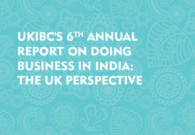UK-India 2020 Priorities: Part 1 – The importance of G2G dialogue to the UK-India relationship
Entering 2020, the UK has a new government and Brexit will go ahead on 31 January. Predictably, there have been a series of articles outlining what this means for the UK-India relationship. We can expect more such opinion leading up to and beyond 31 January. I’m going to add to that series. Sort of.
This blog is more about the new UK Government than it is about Brexit because, other than a FTA, there is nothing that Brexit allows the UK and India to improve the trade and investment relationship that is not already possible. And, it is also worth stressing that there is not a chorus of businesses asking for a UK-India FTA. They recognise that this would suck-up years of energy and may not actually deliver their priorities.
What UK businesses do want is continued effort to improve the regulatory and operating environment in India. India is rising in the World Bank’s Ease of Doing Business ranking, but the reality remains that many businesses, big and small, are grappling with legal and regulatory complexity. And, it has to be said, there are specific UK businesses that have billions of pounds of investment in India at risk because of this complexity.
At the same time, what Indian businesses want is clarity on the UK operating environment. While the UK is 7th in the World Bank ease of doing business rankings, it is an increasingly complex market. For instance, Indian companies want clarity on how close the UK-EU trade partnership is going to be. The majority view is: the closer the better. And they want to understand how devolution impacts their government engagement strategies in the UK. Scotland, Wales, Northern Ireland and, in more recent years, elected mayors in cities across England have all accrued powers that impact the business environment.
So, what can the UK government do to help UK companies succeed in India?
There is an important role for PM Johnson and his most senior colleagues to help UK companies and, at the same time, make India a more attractive investment destination. It is important that the UK Prime Minister shows leadership of the relationship with India. And this leadership needs to be clear-minded, responsive, and engaged.
Clear-minded in that he and, indeed, Mr Modi, must have a clear view of a) what the UK wants from India, b) what India wants from the UK, and, of course, c) how they can make the relationship truly work for both countries.
Responsive in that both parties need to give and take. Find areas of partnership and collaboration. For example, on defence manufacturing and higher education collaboration.
And engaged because top level – PM to PM – commitment matters. Not least as the Indian PM’s Office directly pulls more levers that No 10 Downing Street does. The Johnson-Modi relationship therefore needs to be close, open, based on mutual respect and focussed on what matters most to each country.
This leadership and clarity of purpose will very much set the tone for a successful relationship.
While the PMs should meet at least annually, they need to delegate responsibility and authority to cabinet Ministers, senior business leaders and (the self-serving part) business organisations to make things happen.
That the new UK Government is seeking to build stronger economic relationships beyond the EU is one important piece of context for the UK-India relationship. There are two other important and linked contextual factors that will influence the nature of the relationship and the approach PM Johnson should take to its development.
India, since Mr Modi came to power, has become increasingly assertive in its international relations. There was a criticism of the previous government that it was too soft. Whether that is true or not, the Government of India is now being assertive. And it seems to be both determined and co-ordinated. For example, there was a concerted effort, across the Indian Government, business leaders, and the Indian media for the UK to relax its immigration rules to make it easier for Indian nationals to work and study in the UK. (Interestingly, this successful Indian lobbying was for immigration access that is not available for UK workers or students.)
Linked to this assertiveness, the other factor that needs to be taken into consideration is that the Government of India has shown itself prepared to robustly defend any criticism of its policies, even implied and well-intentioned, from domestic and international parties. For instance, there was an online spat between Indian business leaders and the Finance Minister after the former were critical of the Government’s management of the economy. Similarly, the Government of India took a robust position against the UK’s Labour Party following its members passing a motion at its annual conference critical of the Indian Government’s policy towards Jammu and Kashmir.
So, there is a need for PM to PM engagement to develop the UK-India relationship and a context in which this dialogue will take place. But on which areas should Mr Johnson, Mr Modi and their teams focus?
I’ll make my suggestions in part two of this blog, which will be published on Monday 6th January.

 By Kevin McCole
By Kevin McCole 




